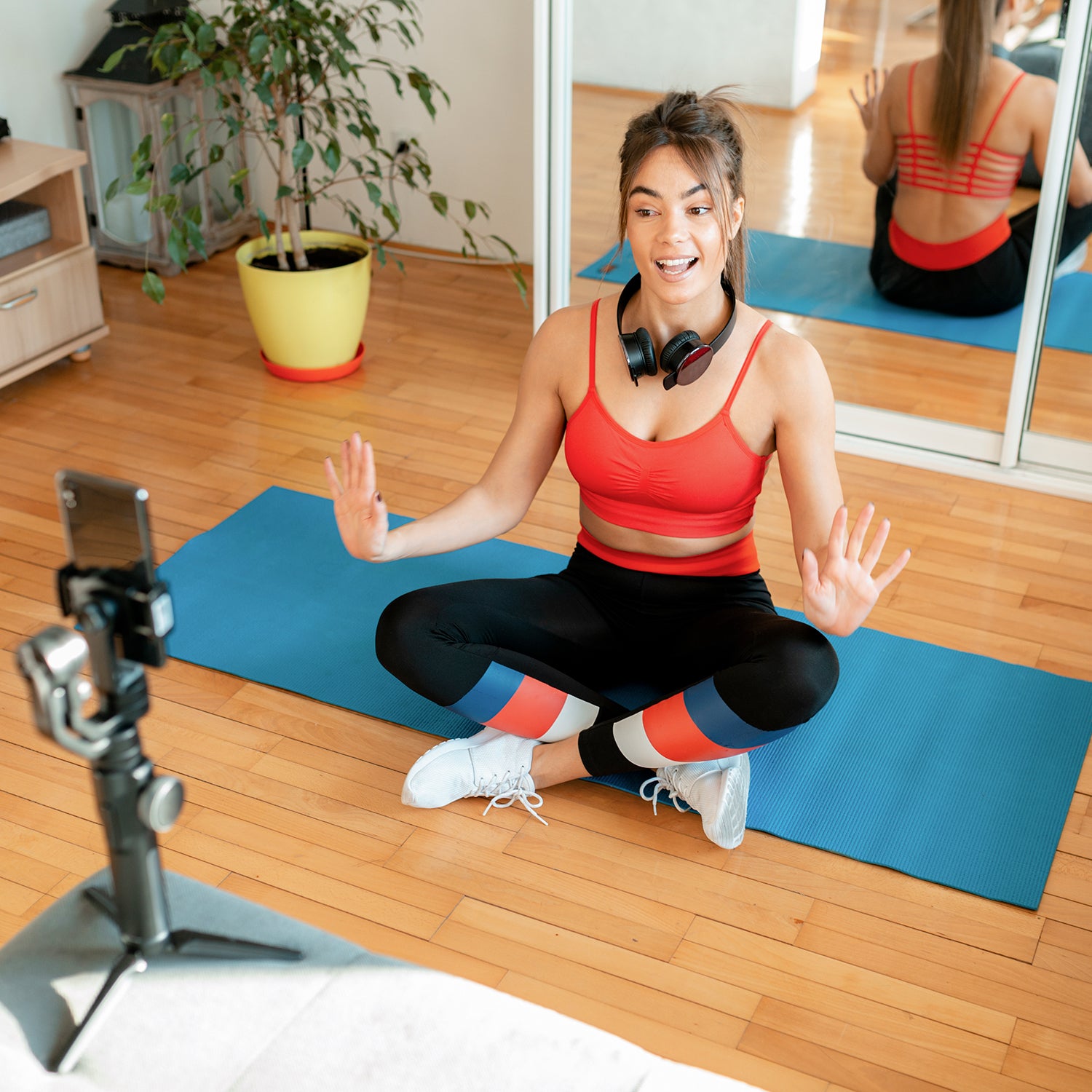Wellness influencers build audiences for themselves on the merit of having an enviable lifestyle, body, or aesthetic. From there it’s easy for them to position themselves as qualified to give advice on how to live more like they do. But having a six-pack doesn’t make you a trainer, and following a regimented diet that works for your body doesn’t make you qualified to write meal plans for someone else.
Hormone-regulating programs are a perfect example of this predatory behavior. In the past six months, it seems like every other wellness influencer on Instagram is suddenly a . All of them have a to sell you, each promising to solve an array of vague but pesky hormone-related problems. Many target hard-to-manage conditions like Hashimoto’s thyroiditis and polycystic ovary syndrome (PCOS), which have symptoms ranging from weight gain to muscle soreness to depression. These symptoms will disappear, they say, if you just cut out dairy, or processed food, or if you eliminate toxins from your life. For you can buy a package of instructional videos, worksheets, and recipes that will purportedly balance your hormones and help you “ditch PMS, repair your metabolism & lose weight effortlessly.” For you can “detox your way to better health,” according to one seller, using food and supplementation to reverse inflammation. For you can buy a supplement that promises to support and nourish your adrenal glands.
Such offers are popular for a reason. Many people who struggle with hormone-related conditions see themselves in the “before” chapter of these influencers’ stories: living with uncomfortable symptoms, feeling ignored by their doctors, and desperate for relief. It’s no wonder that these programs and their supposed results—boundless energy, zero symptoms, and a whole new lease on life—seem irresistible. The problem is, these “hormone experts” aren’t experts at all. They’re opportunists who claim to have found straightforward solutions to incredibly complicated problems and then sell those solutions to vulnerable people.
Health Isn’t Always Simple
Hormone issues are incredibly complicated to diagnose and treat. Your body is home to over , and they are involved in literally every biological process. Their levels are always rising and falling, explains , a New York–based endocrinologist (a medical doctor who specializes in hormones). Small changes—even within a range that a blood test would deem “normal”—can have huge impacts on how you feel. Anyone claiming their program can “balance” your hormones is misleading you, because there’s no magic number that everyone should strive for, and levels vary greatly between individuals and over time. Plus, the range of possible symptoms is huge: low energy, weight changes, irregular periods, skin problems, abnormal hair growth, fertility struggles, and more.
Diagnosing and learning to manage a hormonal condition and the accompanying symptoms takes time and expertise. An endocrinologist might run appropriate tests and then spend months or even years working with the patient to figure out a medication regimen and lifestyle plan that actually works for them. A quick-fix influencer program is an appealing alternative, even if the only evidence backing it up is a smiling face and a few former client testimonials.
Diet does play a role in managing many hormonal conditions. Type 2 diabetes, characterized by the secretion of impaired insulin (the hormone that regulates carbohydrate metabolism), can sometimes be managed through diet alone by regulating carbohydrate intake and regularly tracking blood-sugar levels. Even when insulin injections are required (always with type 1 diabetes, and often with type 2 diabetes), diet still plays a role. PCOS often impairs insulin function as well, so the recommends eating frequent, balanced meals. But these diet recommendations aren’t one-size-fits-all, and they don’t come with guarantees of a symptom-free life.
“Natural” Isn’t Always Better
For certain health conditions, hormone-related or otherwise, there actually is an evidence-based solution that might work for most people, and quickly: medication. Like most doctors, Goddard doesn’t shy away from prescribing medication to help patients manage challenging conditions when appropriate. Medicine can be life changing, even lifesaving.
Unfortunately, there’s stigma attached. “Taking medication has gotten a bad reputation,” Goddard says. “Many of my patients see it as a Band-Aid or quick fix.” Some believe that it’s lazy to take a pill or an injection instead of trying to solve health issues on your own, and wellness influencers play right into this false belief.
“‘Hey, I can help you cure this naturally’ is code for ‘I can help you do this in a more socially acceptable way,’” says , a dietitian and certified counselor based in Greensboro, North Carolina, who works with individuals managing PCOS. On the surface, this seems empowering. It’s nice to think that you have complete control over your health, and that making the “right” choices will keep you well forever. But that just isn’t the case. Virtually no health condition is entirely preventable, and many are too complicated to manage on your own.
Is medication the solution to every chronic condition or health issue? Of course not. Sometimes lifestyle changes are the right answer: the most evidence-based way to manage celiac disease is to avoid gluten, and that has become much easier as gluten-free offerings have expanded in recent years. But while it’s possible to manage type 2 diabetes without insulin, the necessary lifestyle changes won’t be sustainable and effective for everyone. But in the case of an underactive thyroid, for instance, ongoing hormone-replacement therapy is necessary, and no amount of dieting, exercise, or stress management can take its place.
It’s a Woman Thing
These influencer programs, particularly in the realm of hormones, are often made for women, by women. Partly that’s because those who identify as female are socialized to worry far more than their male-identifying counterparts about things like acne, bloating, and weight gain, all of which can be caused by hormonal conditions and irregularities.
But there’s another reason why women are more likely to fall for unscientific wellness advice: in many cases, the science on women’s health conditions is lacking. A published in the Journal of Women’s Health analyzed National Institutes of Health funding and found that diseases that primarily affect women receive far less research funding than those affecting primarily men.
“Without much research behind a condition, there aren’t really tangible, evidence-based solutions that doctors can give,” Dillon says. Worse, a woman might complain about unusual symptoms—rapid weight gain, extreme fatigue, irregular periods—and hear, “Oh, it’s all in your head! I don’t see it, you’re fine, it’s just anxiety.” That dismissal makes influencers, who talk about having similar struggles in a way that’s relatable and validating, all the more attractive.
Health Is Not Universal
Whether the goal is managing a certain condition or just improving overall health, an effective strategy is a personalized one. A trained professional can help you make sense of your health struggles, then work with you to develop an evidence-based plan of action that will be much more effective than some 30-day guide you find on the internet. Dillon says that her approach varies based on the client, because there’s no one PCOS diet. The most important thing, she says, is ensuring that they eat a varied diet and get enough food throughout the day. Being undernourished has a negative impact on hormone function.
Most of what wellness influencers push might seem pretty benign: eating certain foods and avoiding others, exercising a certain way, using “natural” beauty and cleaning products. But experts warn that these recommendations can cause real harm.
Encouraging someone to follow a restrictive diet can lead to nutrient deficiencies, eating disorders, and high stress levels. While influencers peddle the myth that hormone conditions and other issues are caused by gluten, dairy, and processed foods, Goddard says that this isn’t the case, and that restricting these things can lead to orthorexia, an unhealthy obsession with “healthy” eating. Many of Dillon’s clients struggle with both PCOS and eating disorders. She attributes this in part to the fact that they’ve tried so many restrictive diets in an effort to manage their symptoms and are afraid of many foods as a result.
We also can’t ignore the fact that selling bogus solutions is damaging for the people who try them and don’t see results. “Then there’s the experience of blaming oneself: Oh, it worked for other people, it should have worked for me,” Dillon says. That’s distressing.
If you’re struggling to manage a health condition, or if you have uncomfortable symptoms that just won’t go away, don’t fall for what wellness influencers are selling you. Instead, find a primary care provider who makes you feel heard (which isn’t always easy, so ask around and get some recommendations). They’ll help you figure out what’s going on, then give you a realistic plan of action.
Remember, too, that many of the things these influencers pathologize—occasional bloating, imperfect skin, feeling tired—are completely normal and nothing to worry about. Don’t expect to feel 100 percent incredible 100 percent of the time. That’s just not realistic, even if someone’s carefully curated Instagram feed suggests that it is.


